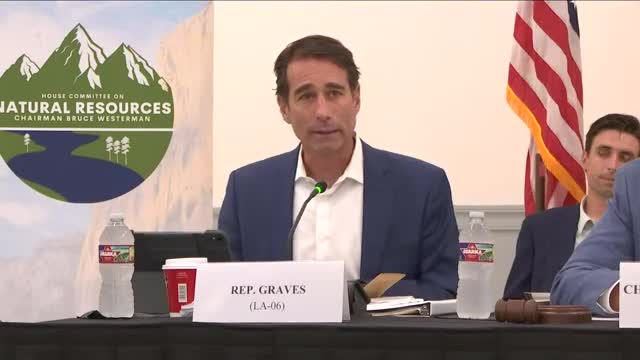Energy Crisis Blamed on Failed US Policies and Inflation
August 03, 2024 | Natural Resources: House Committee, Standing Committees - House & Senate, Congressional Hearings Compilation, Legislative, Federal
This article was created by AI summarizing key points discussed. AI makes mistakes, so for full details and context, please refer to the video of the full meeting. Please report any errors so we can fix them. Report an error »

During a recent government meeting, significant discussions centered around the impact of current energy policies on local economies and national security. A prominent speaker highlighted the stark contrast between current energy leasing rates and those during previous administrations, specifically noting that President Jimmy Carter issued leases for 100 times more acres than the current administration. The speaker emphasized that under Ronald Reagan, the rate was nearly 360 times higher, leading to concerns about rising gasoline prices and utility costs for citizens across the United States.
The speaker argued that these energy policy failures are contributing to inflation and have broader geopolitical implications. They pointed out that reduced domestic energy production has allowed countries like Iran and Russia to profit significantly, with estimates suggesting Iran gained $65 billion and Russia over $105 billion in additional profits. These funds are reportedly being used to support military actions and proxy groups, exacerbating global conflicts.
The discussion also touched on the economic ramifications for local communities, particularly in Louisiana, where decreased energy production translates to less revenue from the Gulf of Mexico Energy Security Act. This reduction in funds directly affects coastal restoration efforts and local economies.
The speaker concluded by advocating for increased domestic energy production, particularly in the Gulf of Mexico, which is noted for its low carbon intensity. They underscored the importance of balancing emissions reduction with the need to meet global energy demands, urging a reevaluation of current policies to better support both local communities and national interests.
The speaker argued that these energy policy failures are contributing to inflation and have broader geopolitical implications. They pointed out that reduced domestic energy production has allowed countries like Iran and Russia to profit significantly, with estimates suggesting Iran gained $65 billion and Russia over $105 billion in additional profits. These funds are reportedly being used to support military actions and proxy groups, exacerbating global conflicts.
The discussion also touched on the economic ramifications for local communities, particularly in Louisiana, where decreased energy production translates to less revenue from the Gulf of Mexico Energy Security Act. This reduction in funds directly affects coastal restoration efforts and local economies.
The speaker concluded by advocating for increased domestic energy production, particularly in the Gulf of Mexico, which is noted for its low carbon intensity. They underscored the importance of balancing emissions reduction with the need to meet global energy demands, urging a reevaluation of current policies to better support both local communities and national interests.
Don't Miss a Word: See the Full Meeting!
Go beyond summaries. Unlock every video, transcript, and key insight with a Founder Membership.
✓
Get instant access to full meeting videos
✓
Search and clip any phrase from complete transcripts
✓
Receive AI-powered summaries & custom alerts
✓
Enjoy lifetime, unrestricted access to government data
30-day money-back guarantee
